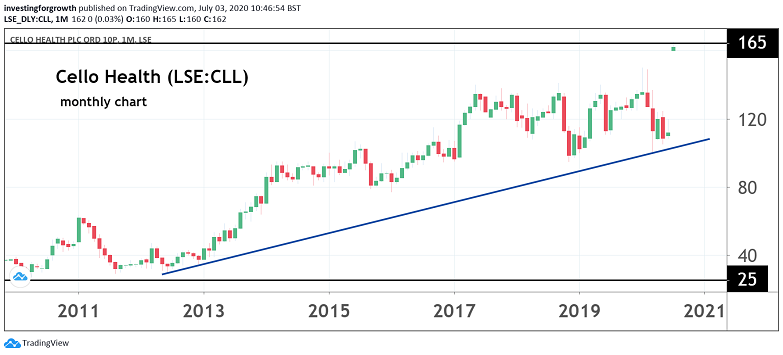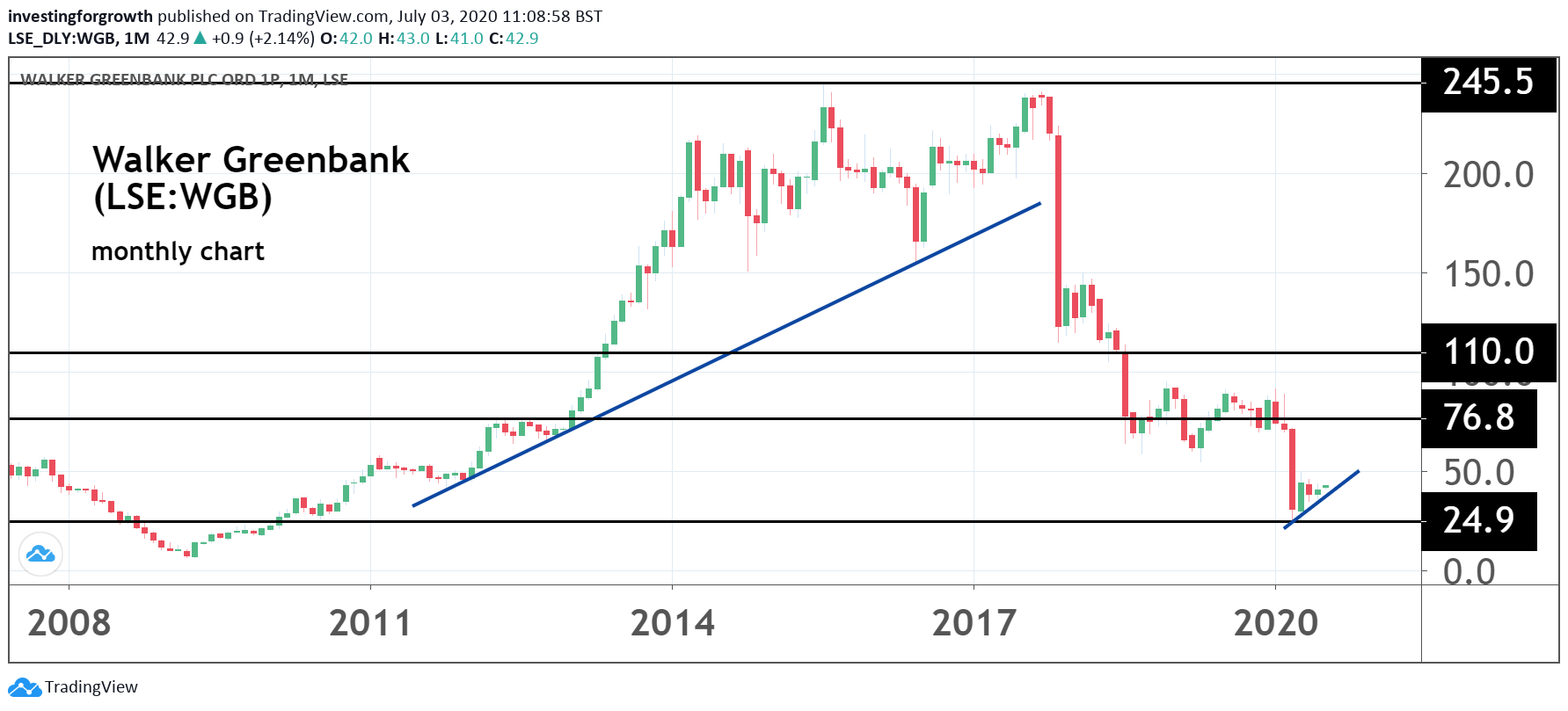Stockwatch: this takeover demonstrates market optimism
Animal spirits may be picking up, and investors may be rewarded for their patience.
3rd July 2020 11:32
by Edmond Jackson from interactive investor
Animal spirits may be picking up, and our companies analyst thinks investors may be rewarded for their patience.

This week’s takeover offer for AIM-listed Cello Health (LSE:CLL) at a 44% premium to market price – or 28% to the six-month average – shows private industry as selectively more optimistic than the stock market.
This is happening despite marketing service type firms typically being seen as facing corporate spending cuts as firms struggle against a second wave of Covid-19. Summary financials (see table below) also show rather pedestrian progress in recent years, and the £179 million cash offer for Cello Health is being promoted on the basis of an enterprise value multiple of 12.3x adjusted EBITDA (underlying operating profit).
Yet the consensus forecast anticipates a re-rating of net profit to about £8 million for 2020 onwards, so possibly the acquirers are keen to snap up Cello before its healthcare-oriented business model kicks in.
A turning point for takeover activity?
From a stock-picking angle, it’s interesting to consider this as possibly a portent of more change ahead; that animal spirits may be picking up.
Data compiled by Bloomberg and released this week, shows the value of global merger/acquisition activity halving to about $1 trillion (£810 billion) in the first half of 2020. Yet, it remains substantial, and the example of Cello, though small, coincides with business now making a determined effort to find a new normal.
Firms may need to find new synergies and re-position generally, takeovers being one means to do so. The timing may be opportune too, as fears remain high about a second wave of Covid-19 undermining stock market values, making investors amenable to offers.
This company also exemplifies a classic perennial form of takeover: well-established businesses the stock market has lost interest in due to lack of visible growth appeal, which can seem unexpected but in hindsight looks obvious.
Sound risk/reward
Cello hasn’t excited for most of its listed history: I originally drew attention at 38p in early 2010, having plunged from over 150p in 2007, and before it changed name from “Group” to emphasise a focus on serving healthcare clients. The stock bumped along upwards, reaching 130p by June 2017, then turned volatile-sideways, falling from 143p last January to 108p amid the Covid-19 scare. So, the 161p current offer will be seen as acceptable.

Source: TradingView. Past performance is not a guide to future performance.
Despite a somewhat tedious evolution, the stock has offered sound risk/reward, and I’ve updated the shares as “remains buy” for ISAs, or ‘hold’ a decade ago on a price/earnings (PE) ratio of 11 times, which rose to the low teens, albeit no extended “growth” multiple. Contrast this with US technology shares currently in vogue, which appear at high risk of mean-reversion over time – even if their underlying performance broadly holds up.
The current generation of day traders seems to have no notion of the US “Nifty Fifty” high-performing stocks of the 1960’s that de-rated sharply in the 1970s. For Brits, value may be right under our noses.
| Cello Health - financial summary | ||||||
|---|---|---|---|---|---|---|
| year ended 31 Dec | ||||||
| 2014 | 2015 | 2016 | 2017 | 2018 | 2019 | |
| Turnover (£ million) | 170 | 157 | 165 | 170 | 159 | 167 |
| Operating margin (%) | 2.5 | 3.5 | -0.8 | 3.6 | 6.1 | 4.6 |
| Operating profit (£m) | 4.2 | 5.4 | -1.4 | 6.2 | 9.7 | 7.6 |
| Net profit (£m) | 2.3 | 3.0 | -2.8 | 4.2 | 6.6 | -0.9 |
| Reported earnings/share (p) | 2.6 | 3.8 | -2.9 | 4.0 | 6.8 | 4.5 |
| Normalised earnings/share (p) | 5.3 | 6.6 | 5.2 | 8.4 | 8.3 | 7.7 |
| Earnings per share growth (%) | -19.1 | 24.6 | -21.1 | 61.0 | -0.6 | -8.1 |
| Operating cashflow/share (p) | 2.8 | 8.0 | 5.5 | 2.6 | 10.4 | 11.9 |
| Capex/share (p) | 1.7 | 1.3 | 2.6 | 1.8 | 1.8 | 1.5 |
| Free cashflow/share (p) | 1.1 | 6.7 | 2.9 | 0.8 | 8.5 | 10.4 |
| Dividend per share (p) | 2.6 | 2.9 | 3.4 | 3.5 | 3.9 | 1.2 |
| Covered by earnings (x) | 1.0 | 1.3 | -0.8 | 1.2 | 1.8 | 3.9 |
| Net debt (£m) | 7.2 | 4.2 | 5.1 | -1.6 | -6.3 | 3.6 |
| Net assets per share (p) | 81.8 | 83.0 | 76.4 | 79.3 | 82.9 | 77.6 |
| Source: Historic Company REFS and company accounts |
Octopus Investments has shown itself taking the patient long-term approach required; I originally noted it had increased its stake from 8% over 9% after a Cello update cited a pick-up in client activity. The table shows unexciting margins, albeit strong cash generation with minimal capital expenditure needs, as befits an agency business. Cello is also internationally-oriented, with networks in the UK, US and Asia. This is likely an aspect of intrinsic value, when serving healthcare.
Recent upturn in underlying activity
The 20 May AGM cited strong overall net revenue and profit growth for the first quarter of 2020, and since March “overall bookings visibility and the new project win rate have been maintained.
Performance of the US business has been notably robust.” Despite the disrupted circumstances, the board was confident about the second quarter; cash generation had been good hence the interim dividend was being maintained after a final earn-out payment. That’s a real contrast with many companies now omitting dividends for cash conservation.
Walker Greenbank has some parallels
This AIM-listed luxury interior furnishings group Walker Greenbank (LSE:WGB) is similar in the sense of having international reach that an acquirer could usefully integrate, plus it has well-respected brands.
Unlike healthcare, however, it is tricky to discern how well discretionary spending on such items can flourish. We’re often told by analysts and fund managers that it will, which is why they favour luxury goods companies.
Yet Walker Greenbank’s narrative has involved caution as to the UK market, and I wonder the extent it is geared to people moving house. Yes, people may spend on refurbishments instead, but my sense is that wallcoverings sales tend to benefit when people set up a new home – replacing other people’s taste.
This stock has been in a frustrating downtrend from 230p three years ago. I rated it a ‘speculative buy’ at 75p in November 2018 and ‘hold’ last February at 78.5p – apparently on a forward PE multiple sub-9x. But the Covid-19 crisis clobbered it briefly to below 30p in March, seemingly a net asset value discount of near 70%.

Source: TradingView. Past performance is not a guide to future performance.
Last Tuesday’s annual results to 31 January showed adjusted underlying pre-tax profit down 22% to £7.4 million, and statutory net profit by 16% to £3.7 million, on revenue 1.6% easier at £111.5 million.
Once out of the closed period ahead of the results announcement, a non-executive director snapped up 52,500 shares at 37p to own 75,000 shares in total, and the chief executive’s spouse bought 46,989 shares at 42.6p.
Clearly, they reckon on value, and at around 42p currently, the multiple of adjusted diluted historic earnings is 4.6x which discounts a lot.
Potential from branded elements of the group
Against seemingly limited downside risk, underlying value hints at upside once the trading environment improves. Despite challenged revenue overall, Walker’s latest narrative cites “growth in core licensing income, brands and digital fabric printing, offset by a difficult marketplace in the UK.”
A combination of domestic reasons might refer to a sluggish housing market to cautious spending, but relying on rich folk doesn’t appear a cert. Adapting to this, a £2 million annualised cost-savings initiative has completed, but it’s unclear whether it will suffice going forward.
More drastic action has been required than at Cello, which as a people-driven business was able to continue pretty much as normal. Walker’s fabric/wallpaper printing factories also showrooms in the UK, New York and Paris were seemingly shut for three months, non-essential capital expenditure suspended and no final dividend will be paid.
All sites are now open however, with a phased return of staff “as demand builds ahead of the autumn selling season” - so they appear to hope.
- Richard Beddard: why I want Bloomsbury to succeed
- AIM at 25: all grown up and outperforming the big boys
- Take control of your retirement planning with our award-winning, low-cost Self-Invested Personal Pension (SIPP)
As lockdowns ease “there are initial signs of trade improving albeit at a level below last year”. The sales hit to the first five months of the year to January 2021 is quantified around 35%, with online and international product sales doing better than the UK average.
So, the current period is somewhat opportune for an international consumer goods group to gain synergies, integrating Walker Greenbank product into their channels and vice-versa. It boasts “market-leading brands, an extensive design archive and high-quality manufacturing facilities.”
Would a manufacturing business of similar economics want to assume the risk of acquiring another at a time like this? As an agency type business Cello is a different proposition, certainly regarding capital demands.
About 41% of revenue is derived abroad, with Europe representing about a third of that, hence a no-deal Brexit would represent some uncertainty. Management says its products are sold in over 85 countries, so if the stock was to suffer Brexit blight then this could enhance takeover appeal. It would also limit the extent of premium required, with shareholders willing to accept an exit. I speculate.
| Walker Greenbank - financial summary | ||||||
|---|---|---|---|---|---|---|
| year ended 31 Jan | ||||||
| 2015 | 2016 | 2017 | 2018 | 2019 | 2020 | |
| Turnover (£ million) | 83.4 | 87.8 | 92.4 | 112 | 113 | 111 |
| Operating margin (%) | 8.8 | 9.3 | 8.3 | 11.8 | 5.8 | 4.3 |
| Operating profit (£m) | 7.3 | 8.2 | 7.7 | 13.2 | 5.9 | 4.8 |
| Net profit (£m) | 5.1 | 5.9 | 5.4 | 11.9 | 4.4 | 3.7 |
| Reported earnings/share (p) | 8.3 | 9.5 | 8.1 | 16.8 | 6.2 | 5.2 |
| Normalised earnings/share (p) | 9.4 | 13.8 | 25.0 | 21.6 | 10.8 | 9.2 |
| Price/earnings multiple (x) | 4.6 | |||||
| Operating cashflow/share (p) | 5.3 | 10.3 | 15.0 | 6.4 | 16.3 | 11.6 |
| Capex/share (p) | 5.3 | 4.1 | 10.2 | 4.9 | 4.2 | 3.4 |
| Free cashflow/share (p) | 0.0 | 6.2 | 4.8 | 1.5 | 12.1 | 8.2 |
| Dividend per share (p) | 2.3 | 2.9 | 3.6 | 4.4 | 3.2 | 0.5 |
| Covered by earnings (x) | 3.6 | 3.3 | 2.2 | 3.9 | 1.9 | 18.4 |
| Net debt (£m) | 0.0 | -2.3 | 5.3 | 5.3 | -0.4 | -1.3 |
| Net assets per share (p) | 45.1 | 58.6 | 73.7 | 87.2 | 85.8 | 91.3 |
| Source: Historic Company REFS and company accounts |
Shares offer value despite annual pension cost
At 42p a share, there’s a huge discount to net asset value of 91.3p a share, but mind it represents 46% of £64.8 million net assets constitute intangibles. Debt is a minimal £1.7 million, short-term, although longer-term liabilities involve £5.6 million leases and a £5.7 million pension deficit (down from £9.7 million). A pension fund recovery plan has been agreed involving circa £1.8 million annual contributions to eliminate a funding shortfall by October 2026.
Both these costs are a nuisance - the cash flow statement shows a cost of £2.7 million lease liabilities alongside the dividend taking £2.2 million. So, with the pension contribution kicking in, if the trading environment remains compromised then the dividend would remain pressured.
Walker’s takeover appeal isn’t, therefore, as obvious as Cello’s, and investors will need patience against various medium-term hurdles the business faces. Yet, similarly as I feel US tech will eventually mean-revert down, this stock will re-rate. Buy.
Edmond Jackson is a freelance contributor and not a direct employee of interactive investor.
These articles are provided for information purposes only. Occasionally, an opinion about whether to buy or sell a specific investment may be provided by third parties. The content is not intended to be a personal recommendation to buy or sell any financial instrument or product, or to adopt any investment strategy as it is not provided based on an assessment of your investing knowledge and experience, your financial situation or your investment objectives. The value of your investments, and the income derived from them, may go down as well as up. You may not get back all the money that you invest. The investments referred to in this article may not be suitable for all investors, and if in doubt, an investor should seek advice from a qualified investment adviser.
Full performance can be found on the company or index summary page on the interactive investor website. Simply click on the company's or index name highlighted in the article.
Disclosure
We use a combination of fundamental and technical analysis in forming our view as to the valuation and prospects of an investment. Where relevant we have set out those particular matters we think are important in the above article, but further detail can be found here.
Please note that our article on this investment should not be considered to be a regular publication.
Details of all recommendations issued by ii during the previous 12-month period can be found here.
ii adheres to a strict code of conduct. Contributors may hold shares or have other interests in companies included in these portfolios, which could create a conflict of interests. Contributors intending to write about any financial instruments in which they have an interest are required to disclose such interest to ii and in the article itself. ii will at all times consider whether such interest impairs the objectivity of the recommendation.
In addition, individuals involved in the production of investment articles are subject to a personal account dealing restriction, which prevents them from placing a transaction in the specified instrument(s) for a period before and for five working days after such publication. This is to avoid personal interests conflicting with the interests of the recipients of those investment articles.